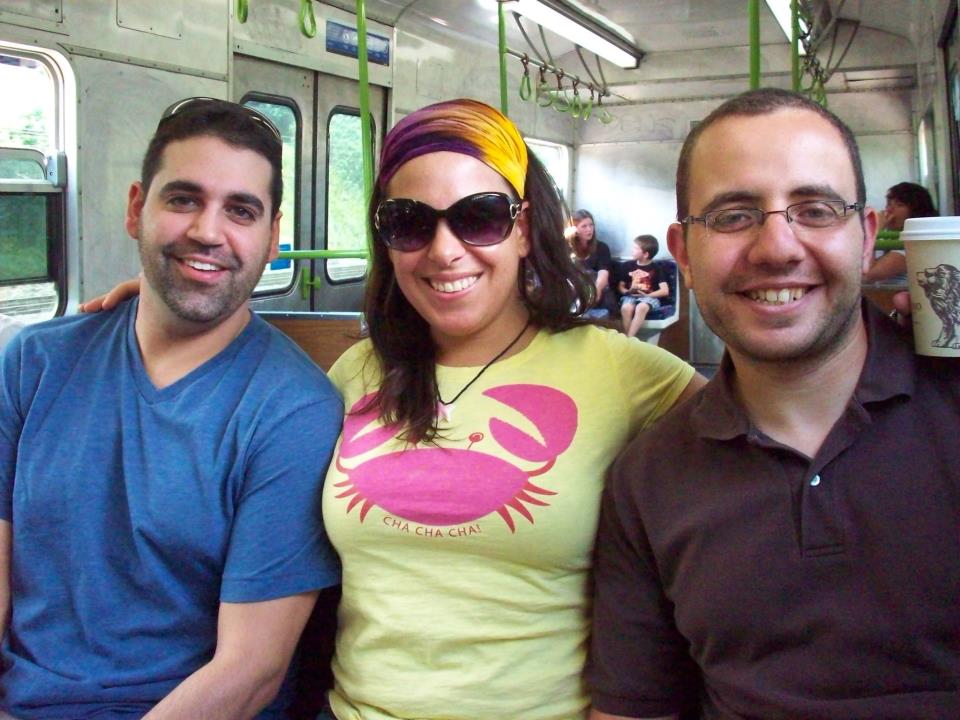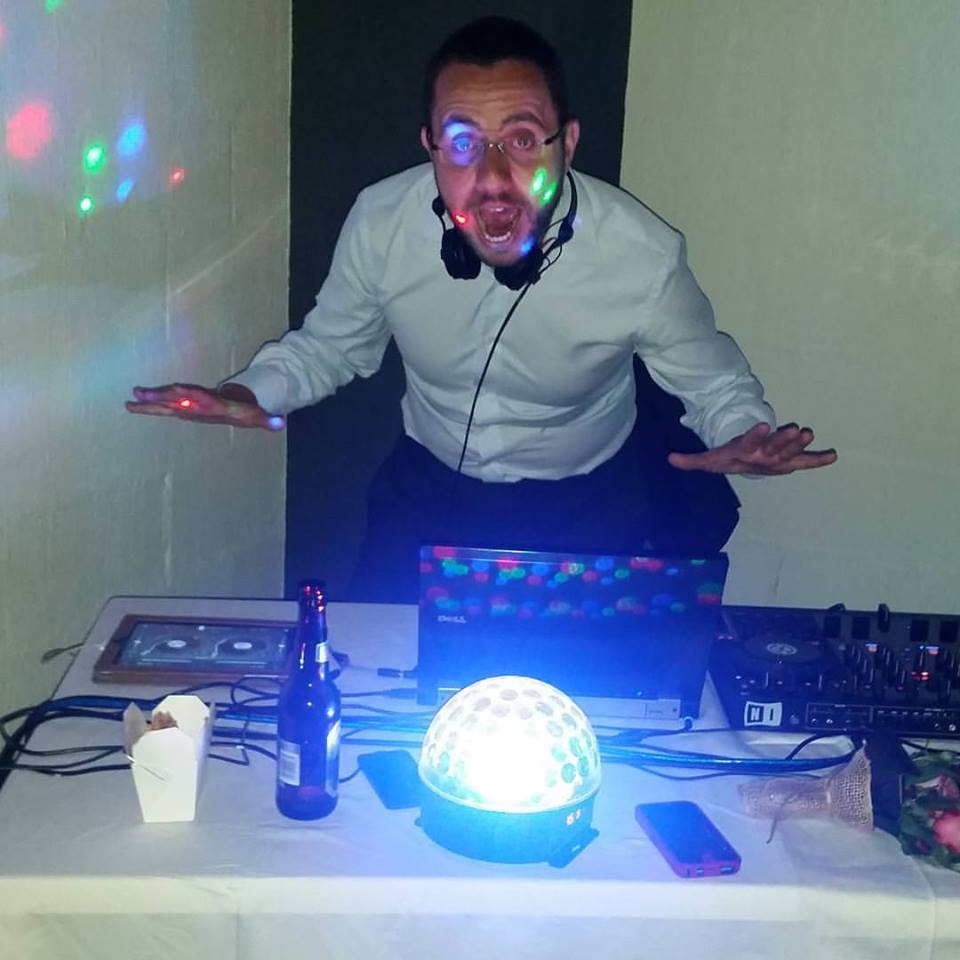Welcome to Part 2 of the Embolden Adventures – A Wedding in Jordan podcast series.
In this episode, my friend Jen’s fiancé, Adam, joins us to talk about
- That time he sang in his Jordanian rock band
- His Hollywood-Jordanian movie career
- The King of Jordan
- The local food, wine, and beer scene
- and more!
In the previous episode, we talked to Jen who is planning her destination wedding in Jordan. You can listen to Part 1 of this podcast here and read more about it on this blog post. You will learn about the places we will be visiting and get a basic itinerary of the trip.
The final part of the series, we experience a trip of a lifetime around the country of Jordan.
Adam, is one of my favorite friends. He’s friendly, he’s funny, and he has such an interesting background. He is originally from Jordan and now lives in Melbourne, Australia with Jen.
Meet Adam
Adam was born in Amman, Jordan. His parents are from Palestine, although his mom has lived most of her life in Jordan. His dad was born in Jerusalem and grew up in an area south of Palestine called Beersheba. When Adam was young, he and family moved to Kuwait for economic opportunities and spent a number of years there including the time during the First Gulf War between Kuwait with US and Iraq.
After the war ended, Adam and his family moved back to Amman in 1992. Throughout his time living in the Middle East, Adam and his family moved around a lot, especially in Kuwait to seek out different safe spots during the war.
He attended high school and university in Jordan before finally moving to Australia in 2010.
Adam is prideful of his Jordanian traditions, cultures, and roots. He has many fond memories of his friends, family, and experiences living in Jordan including the time he worked on a few Hollywood films in Jordan and when he sang in a local rock band.
Adam formed the band with his friends in Amman, and he sang back-up vocals. They called themselves “Twenty Days” because, as Adam says, “they had 20 days to prepare for their first gig.” The band recorded some songs in addition to playing their show but never ended up performing a second gig…well, never say never!
Adam’s Podcast Pick
The song in this podcast episode is called “Mali Shughul Bil Souq” and it is performed by Ilham Madfa3i, a popular guitarist, singer, and composer originally from Iraq and now living in Jordan. Also known as the “Baghdad Beatle”, his musical sound blends Western guitar playing with traditional Iraqi cultural music, creating a “hip style”.
In this recording, Ilham is playing an oud, a pear-shaped, 12-stringed instrument, similar to a small, acoustic guitar. The song begins with traditional, acoustic sounds and then transitions to an upbeat rhythm.
Ilham sings about meeting his love in the “souq” or market. Adam translates some of the Arabic lyrics to “I didn’t have anything to do in the market. I just passed by to see you.”
“It’s a nice story” and a “lovely song,” says Adam. “He is talking about his love. The style is happy and it brings a smile to my face.”

A Brief History of Jordan
Jordan is located in the heart of the Middle East, and it is considered to be one of the safest Arab nations in the region. The area has a deep, rich history dating as far back as the pre-Biblical times. The Nabataeans, who are thought to have built the ancient city of Petra, once ruled the area from 168 BC until 106 AD until they were conquered by the Roman Empire. Between the end of the Roman Empire in 636 AD and the beginning Ottoman Empire in 1516, the area was conquered over time by separate Muslim and Crusader conquests.
After World War I ended, France and Britain spilt the Ottoman Empire in 1918 and established the Emirate of Transjordan that was a British protectorate. In 1946, Jordan became an independent, sovereign state and later its name changed to the Hashemite Kingdom of Jordan.
The country is named after the Jordan River, and the word Jordan is thought to translate to “yarad”, a Hebrew word meaning “the descender”.
The country is not in an oil region unlike its wealthy Gulf state neighbors. Jordan has limited natural resources with the exception of phosphate that they export. Their main value can be derived from tourism and education.
Today, Jordan has a population of approximately 9.5 million people comprising of different religions and regional cultures. The country is home to many migrating peoples who, over the years, have sought safer areas from troubles in the wider region including Palestinians, Iraqis, and most recently Syrians.
Jordan is “a good melting pot where you get lots of different people with lots of different backgrounds,” says Adam. Amman is a diversified city that “thrives on the problems of other cities” in the region.
The people of Jordan are generous, welcoming, and treat any of their guests very well.
In fact, Amman is the “City of Brotherly Love.”
Did you know…?
In the 3rd Century BC, King Ptolemy II Philadelphus of Egypt conquered Amman and renamed it “Philadelphia” after himself. The city continued to be named Philadelphia until reverting back to its original name, Amman after the fall of the Roman Empire. It was first named Amman when the Ammonites ruled the area back in 3000 BC.
The Kingdom of Jordan
As with the United Kingdom, Japan, and Spain for example, Jordan is a country with a constitutional monarchy The King of Jordan is King Abdullah II who succeeded his father King Hussein in 1999.
The royal family has ruled Jordan since 1921. Their surname is Hashemite, and they can trace their roots from Saudi Arabia as far back to the great-grandfather of the prophet Muhammad who is Hashem.
Adam has a royal family connection through his mother who is from the same Hashemite family, although far removed. She even went to the same school as King Hussein. Her uncle was the head of the Advisory Council to the King during his reign and became an ambassador.
Growing up in Jordan, Adam remembers seeing pictures of King Hussein with his uncle, and he felt as if knowing the King was just a “normal” thing.
Jordan was a tight community back then. Roots and family names have been very important in Jordanian culture as with reverence for the King and their songs.
Upon moving to Australia, Adam was surprised to see that people in the western world did not identify with their family names or trace their roots so far back in time as they did in Jordan.
“When you meet someone [in Jordan], you always ask them ‘What’s your family name?’ because you end up saying, ‘Oh, I know your cousin, or I know your uncle.’”
And…Adam’s world came to my world back in the early 1980s.
I grew up in Connecticut near the all-girls boarding school, Westover. King Hussein’s daughter Princess Zein graduated from Westover and the King came all the way from Jordan for the graduation ceremony and to address the class. I was about six years old at the time, and it sounded just like a fairy tale to my child’s mind. In King Hussein’s address, he celebrated the freedoms of the modern woman and urged the generations ahead to work hard to eradicate poverty, hunger and war.
Who would have thought that now I have the chance to come to Jordan to see the King’s world and meet Adam’s family!
I am beginning to read Queen Noor’s autobiography, Leap of Faith, on Jen’s recommendation before I head to Jordan. In the book, there is a glossy colored photo of her and King Hussein riding a Harley Davidson motorcycle in the red Wadi Rum desert. Jen says reading the book “is a very great way to get a perspective on the politics but also just the personal side of being an outsider who becomes Jordanian.”
“I was so impressed how she made the transition of being an American to being fully committed as the Jordanian Queen. It is fascinating,” Jen notes.
Adam’s Hollywood Career
The Wadi Rum desert may be a familiar location to those who are movie buffs. It has been featured in Lawrence of Arabia and The Martian to name a few movies. In fact since 2005, Jordan has a popular destination to shoot Hollywood movies such as Transformers 2, The Mummy Returns, Fair Game, and The Hurt Locker, and one of the Princes of Jordan continues to work to promote Jordan to the film industry.
A few local and independent films have shot in Jordan as well such as the Canadian film, Incendies, the Jordanian film, Theeb, and Rosewater, the Jon Stewart drama about a reporter imprisoned in Iran. In 2011, Incendies was nominated for Academy Award for the Best Foreign Language Film, and in 2015, Theeb was nominated for Academy Award for the Best Foreign Language Film, making it the first Jordanian film ever nominated.
Theeb is a movie about a young Bedouin boy who lives in Wadi Rum during World War I and the Great Arab Revolt against the Ottoman Empire. The film was directed locally and features actors who are from the local Bedouin communities.
“It is a very interesting movie to watch about an interesting time, which is kind of close to the Lawrence of Arabia time,” said Adam. Jen adds: “The difference between Lawrence of Arabia and Theeb, they are set in similar times but you can see one of them is written from a British perspective and one of them is actually from a local Jordanian perspective…They are quite different.”
And Adam’s friend Yanal worked as the Assistant Director on Theeb. This friend is who introduced Hollywood to Adam back in the day.
Adam was working at his job as a software engineering when he was living in Amman, and he got a call from Yanal to help out for a few days as a production assistant during the filming of The Hurt Locker back in 2007. Eventually, he found his way on to the big screen.
Adam was asked to escort two movie extras to the balcony of a minaret. Adam had his walkie-talkie and would have to share directions to the two extras from the crew down below.
“Because The Hurt Locker was about the war in Iraq, we had some extras and they were some of the Iraqi people who moved to Jordan…The funny part about it was I had only two people with me…They were giving me signals – ‘alright let the first one do this…let the second guy do this. Tell the third guy to do this’ and I was like ‘There is no third guy. What are you talking about?’ It was a really funny moment because I heard this pause after I said that and then they said ‘You’re the third guy!’”
In this scene of The Hurt Locker in the clip below at 0:30, you can find Adam standing to the left. Also, the scene can be found on minute 40 of the full movie.
Adam continued to work as a production assistant for a few other films: Transformers 2, Incendies, and Fair Game.
On the set of Transformers 2, Adam was an English-Arabic translator between the crews and a Grip in addition to his production assistant work.
“Some stuff I didn’t know how to translate, so I thought, ‘ok I don’t know how to translate this, I might just go and do it.’”
For the movie, they wanted to film in Petra at one of the carved façades called the Monastery. To get there, the crew had to climb 800 steps and transport two tons of equipment including a big crane that can film at 360-degree angles. They debated using a donkey to move the equipment but shut down that idea right away. Eventually, they borrowed a Black Hawk helicopter from the Jordanian army to move the equipment.
You may remember another famous movie setting in Petra: Indiana Jones and the Last Crusade, where a few scenes were filmed at another carved façade, the Treasury. In this scene, Indiana Jones meets an old knight inside the Treasury who is protecting the Holy Grail. In real life, the Treasury is just an empty room as these structures were used for more ceremonial purposes. Perhaps we will find the Holy Grail when we visit Petra!
The Jordanian Flavor
After wrapping up production, I would think a little bit of a celebratory feast would be in order.
The cuisine in in the country is a mix of Palestinian and Jordanian tastes. Food cooked at the home usually consists of a rice dish with a vegetable stew and some type of meat. The main red meat is lamb and most dishes are chicken-based. Some vegetarian dishes are falafel, hummus, or rice with lentils. When hosting guests, meals are served with meat as a gesture of generosity.
Typical dishes in Jordan are:
- Mansaf: A traditional Jordanian dish that originated from the Bedouin tribes. It is made with bread, rice and has meat on top, and it is served with jameed, a yogurt sauce, on the side. Jameed is dried until it is hard and then it is cooked with the meat broth. Mansaf is shared communally and is eaten by hand.
- Falafel and hummus: The Jordanian version of the falafel is light, crispy, and fresh, and their version of hummus is very smooth.
- Maloubeh: A rice dish with lots of chicken that is flipped upside down after it is cooked.
- Shawarma: Like a kebab or souvlaki but lighter and simpler
- Zarb: A Bedouin barbeque with lamb, chicken, and vegetables cooked with hot coals in an open pit beneath the sand.
In addition to the local flavors, Amman is has a wide variety of cuisines including upscale bistros, steakhouses, Italian restaurants, and sushi places.
“It’s not like the Tsukiji fish market, but it’ll do,” says Adam about the Jordanian sushi. In 2014, Adam, Jen, and I enjoyed the fresh sushi from the famous Tsukiji fish market in Tokyo, so if Adam thinks the sushi in Amman is good enough then I’m going to try it!
Amman even has the common western fast food chains such as McDonalds, Burger King, and KFC. Since Adam runs a fried chicken food blog called The Chicken Scene, I asked him about the fried chicken in Jordan. He did a review when he was in Jordan this past year, although Adam gives the Jordanian fried chicken just 1 cluck – read about his thoughts here.
Did you know…?
The first local microbrewery has emerged in Jordan.
Called Carakale after the caracal, an endangered Jordanian desert lynx, the brewery offers a range of really good brews from a blond ale and a whiskey ale to a mocha stout. The brewery is located in Fuheis outside of Amman and bottles are beginning to be sold around Jordan. Some press can be found here and here. We will be sure to check it out!
Also, Jordan has an ancient wine region from the biblical era that still produces wine. Some even say that the wine served at the Last Supper was from the Umm Qais region in northern Jordan
Though the region is not as big as Napa Valley in California, they are producing 500,000 liters per year. When Jen and Adam toured a museum in Jordan, they saw the remains of what is believed to an original wine press. .
And The Wedding!
At Jen and Adam’s wedding, we will be sure to try some of the local dishes including the mansaf, hummus, falafel, mezze “snacks”, and zarb.
Weddings in Jordan incorporate both traditional wedding ceremonies and western accents such as a DJ and dancing and cutting the cake at the reception. The wedding ceremonies range from secular to very religious, depending on the families who have their own way to celebrate the occasion.
Christian-style weddings feature the typical ceremony at the church with a priest. In Muslim weddings, a sheikh officiates the wedding ceremony and passages are read from the Koran.
Prior to the wedding ceremony, the families come together at the Jaha where the groom’s family visits the bride’s family to ask for the daughter’s hand in marriage over a sit-down with coffee and treats. Sometimes the families celebrate and dance during the Jaha meeting.
The night before Adam and Jen’s wedding, the younger, local friends and family will join us foreign friends in a celebratory party in the city of Amman that will be DeeJayed by Adam!

At the wedding reception, celebrations begin with the entrance of the zaffa band followed by the bride and groom. A zaffa is a traditional and charismatic ensemble band in Jordan and elsewhere in the Arab world. The band carries large drums, bongos, and tambourines in the performance and is accompanied sometimes by belly dancers.
Their style of dress is an “old Mediterranean look” that features pantaloons, big baggie shirts, a red sash belt, and headwear. Jen thought they looked a bit like pirates when she first saw a zaffa band at a wedding.
“It’ll be interesting. It’s very festive and lots of energy comes into it…It’ll be amazing. I think it will be really hard for you to hold yourself back from joining in and dancing and clapping,” assures Adam.
Another dance during the wedding reception is the Dabke that is a well-known, festive dance in the region featuring fancy footwork. People dance in a circle or in a line and jump up and down.
These weddings are not quiet to say the least. Jen says “they know how to party.”
I cannot wait to get to Jordan to celebrate the wedding of these two lovely people, Jen and Adam. Thank you for inviting us to your special day.
Stay tuned for more on the next episode of Embolden Adventures. We will bring to you the sights and sounds of our trip around Jordan and of course of the wedding festivities!
Thank you for joining us on today’s Embolden Adventures podcast!
Remember to subscribe to the Embolden Adventures podcast on iTunes here and please rate the show!
Sign up on the Embolden Adventures website to receive email updates and new content on travel adventures.
Until next time Adventurers


